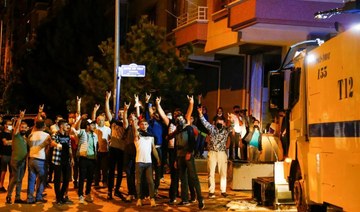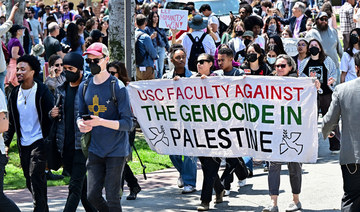GENEVA: The UN special envoy for Syria on Thursday voiced his growing concern at increased hostilities in the south of the country and warned of the alarming shortages faced by civilians.
Norwegian diplomat Geir Pedersen reiterated his call for an immediate end to the violence and urged all parties to uphold the principle of protecting civilians.
“Increased hostilities, which have included heavy shelling and intensified ground clashes, have resulted in civilian casualties, as well as damage to civilian infrastructures,” his office said in a statement.
“Thousands of civilians have been forced to flee Daraa Al-Balad. Civilians are suffering with acute shortages of fuel, cooking gas, water, and bread. Medical assistance is in short supply to treat the injured.
“The situation is alarming.”
At Thursday’s virtual meeting of the International Syria Support Group’s Humanitarian Task Force, Pedersen stressed that immediate, safe and unimpeded humanitarian access must be granted to all affected areas and communities, and that the near siege-like situation must end.
“There is the potential for increased confrontations and further deterioration unless there is an immediate calm and a political way forward,” Pedersen’s office said.
“The special envoy also continues to hear from people in Daraa, including civil society representatives on the ground, who have expressed grave fears for their safety.”
He also noted an escalation of violence in northwest Syria, and multiple water security challenges in the northeast.
Syria’s war has killed around half a million people since 2011 with a brutal crackdown on anti-government protests.
UN Syria envoy alarmed by hostilities, civilian shortages
https://arab.news/9r9we
UN Syria envoy alarmed by hostilities, civilian shortages
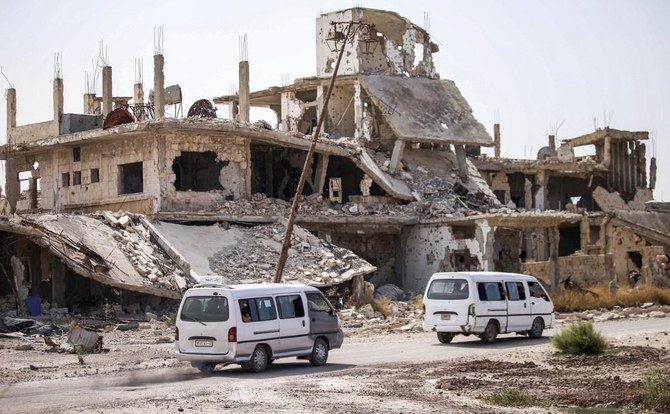
- Pedersen reiterated his call for an immediate end to the violence and urged all parties to protect civilians
- He stressed that immediate and unimpeded humanitarian access must be granted to all affected areas
At UN General Assembly, Pakistan proposes collective efforts to thwart space weaponization
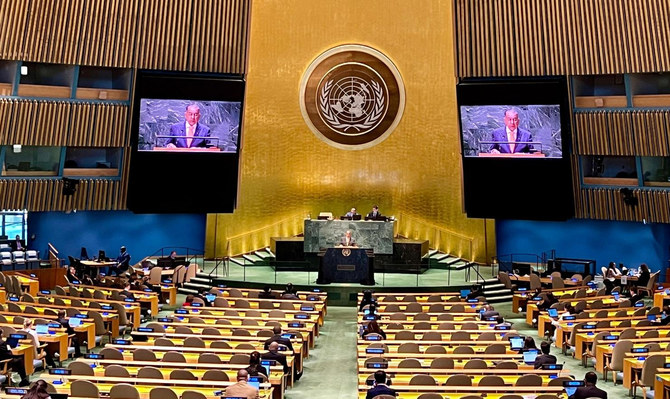
- Pakistan’s UN ambassador says threats in and from outer space have “escalated sharply” in recent years
- Expresses concern over deployment of missile defense systems, their integration with space technologies
ISLAMABAD: Pakistan’s ambassador to the United Nations this week proposed collective action against the weaponization of outer space, citing proliferation of destructive weapons in the territory by major powers during a debate at the UN General Assembly.
Munir Akram, Pakistan’s permanent representative to the UN, was speaking at a debate at the General Assembly on Monday over Russia’s decision last month to veto a draft US-Japan resolution that called on countries to prevent an arms race in outer space. The Security Council rejected the resolution by a vote of 13 in favor to one against, with China abstaining from the vote.
The vote came after Washington accused Moscow of developing an anti-satellite nuclear weapon to put in space. Russia has denied the allegations, with its President Vladimir Putin saying Moscow was against putting nuclear weapons in space.
During his speech at the UN General Assembly, Akram said threats to security in and from outer space have “escalated sharply” in recent years, adding that it was evident from the placement of weapons in space.
“Ambassador Munir Akram called for the issue of weaponization of outer space to be transmitted to the Conference on Disarmament for further consideration and urged collective action to preserve outer space for peaceful purposes,” a press release from Pakistan’s permanent mission to the UN said on Tuesday.
Akram said Pakistan has always maintained a principled position that resolutions on global disarmament should be deliberated and concluded in a transparent manner. He called for doing so at appropriate forums such as the Conference on Disarmament, the UN Disarmament Commission, and the first Committee of the General Assembly.
“In his statement, Ambassador Akram underscored the gravity of the situation, citing the proliferation of weapons in space and the increasing militarization of outer space by major powers,” the statement said. “He expressed concern over the deployment of missile defense systems and their integration with outer space technologies, warning of the destabilizing impact on global and regional security.”
He said if nuclear weapons were deployed in outer space, it would constitute a violation of the Outer Space Treaty. Akram highlighted the need for multilateral cooperation, particularly within the Conference of Disarmament, to address growing threats posed by outer space’s weaponization.
Pakistan is eager to take strides in its own space program. China last Friday launched a Pakistani satellite, ‘ICUBE-Qamar’ or ICUBE-Q into outer space, which is set to enter the lunar orbit on a high-stakes moon mission to reach the lunar side. The launch was part of China’s Chang’e-6 mission, a planned robotic lunar exploration mission, that aims to obtain the first-ever soil and rock samples from the lunar far side and return them to Earth.
The satellite was designed and developed by IST (Pakistan’s Institute of Space Technology) with China’s Shanghai University and Pakistan’s national space agency SUPARCO, state media had reported.
A senior ICT official who was co-lead on the project said last week that this is Pakistan’s first deep space mission, describing it as a “historic moment.”
Saudi Aramco’s net profit hits $27.27bn in Q1 2024
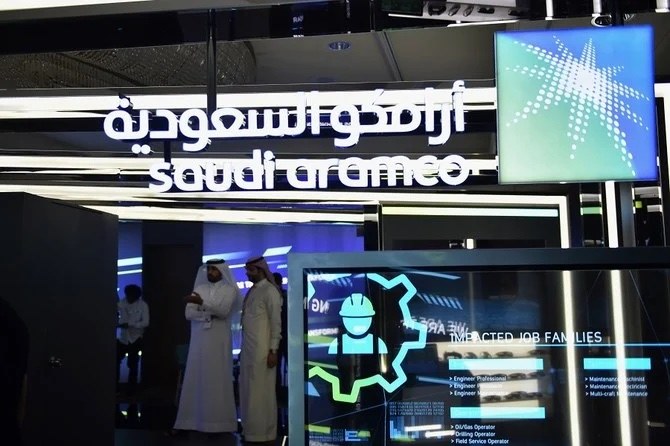
RIYADH: Energy giant Saudi Aramco reported a net profit of $27.27 billion in the first three months of this year, marking a 2.04 percent increase compared to the previous quarter.
According to the company’s statement, the state-owned oil firm’s total revenue for the first quarter stood at $107.21 billion, with the total operating income for the period reaching $58.88 billion.
Amin H Nasser, president and CEO of Saudi Aramco, said: “Our first quarter performance reflects the resilience and strength of Aramco, reinforcing our position as a leading supplier of energy to economies, to industries and to people worldwide.”
However, when compared with the first quarter of the previous year, the net profit of the Tadawul-listed firm declined by 14.44 percent by the end of March 2024.
Despite lower net income, Aramco declared a base dividend of $20.3 billion for the first quarter and anticipates distributing its fourth performance-linked dividend of $10.8 billion in the second quarter.
Timberwolves maul Nuggets, Brunson fires Knicks over Pacers
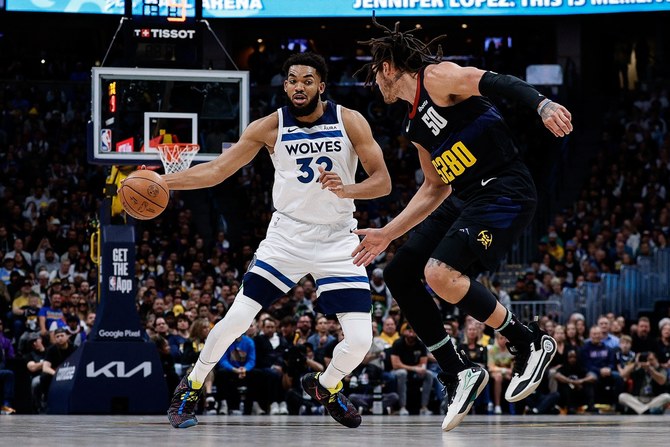
- Remarkably, Minnesota’s dominance was achieved without Rudy Gobert, the Frenchman who is one of the defensive pillars of the Timberwolves lineup
- Knicks talisman Brunson finished with 43 points, six rebounds and six assists to give New York the early advantage in their best-of-seven conference semifinal
NEW YORK: The Minnesota Timberwolves produced a dominant defensive display to seize a commanding 2-0 lead in their best-of-seven playoff series against the Denver Nuggets with a 106-80 road victory on Monday.
The third-seeded Timberwolves harassed Denver relentlessly to claim a second straight win over the NBA champions as the series heads back to Minneapolis for Game 3 on Friday.
Karl-Anthony Towns and Anthony Edwards scored 27 points apiece but the star of the show was Minnesota’s suffocating defensive effort, which knocked Denver out of their stride almost from the tip-off.
The Timberwolves finished with 11 steals and 12 blocks, in sharp contrast to Denver who posted just six steals and five blocks.
Remarkably, Minnesota’s dominance was achieved without Rudy Gobert, the Frenchman who is one of the defensive pillars of the Timberwolves lineup.
Gobert skipped the game in order to be with his partner after the birth of the couple’s son earlier Monday.
“When you don’t got the defensive player of the year, you got to step your game up,” Towns said afterwards.
“We all understood the challenge coming in against the defending champions, a really good team, with some of the best players the game’s ever seen.
“We just wanted to come here and find a way to win the game.”
The normally unflappable Nuggets may also be without star point guard Jamal Murray for Game 3.
Murray was caught on camera hurling a heat pack onto the court in the second quarter, raising the possibility of a suspension when the incident is reviewed by NBA disciplinary chiefs.
That incident was emblematic of the Nuggets’ woes in a game that saw Minnesota in control after they surged into a 28-20 lead at the end of the first quarter.
A disastrous second quarter for Denver saw them outscored 33-15 by Minneapolis, leaving the Timberwolves leading 61-35 at halftime.
Minnesota’s iron-clad defense never looked like surrendering that advantage in the second half and the visitors raced into a 32-point lead early in the third quarter to leave Denver’s Ball Arena in stunned silence.
Denver coach Michael Malone admitted: “We just got beat up in our building and we got embarrassed in front of our fans.
“The good thing is we’re not playing until Friday, so we have a chance to get away and think about what we want to do moving forward,” added Malone.
“I’m not worried about anything other than trying to win Game 3.”
In Monday’s other playoff game, Jalen Brunson had a scintillating fourth quarter as the New York Knicks edged the Indiana Pacers 121-117 in their Eastern Conference opener.
Knicks talisman Brunson finished with 43 points, six rebounds and six assists to give New York the early advantage in their best-of-seven conference semifinal.
But it was his ice-cool performance down the stretch that swept New York to victory in front of 19,812 fans at an electric Madison Square Garden.
The Knicks guard rattled in 21 points in the fourth quarter to complete his fourth straight playoff game with 40 points or more.
Donte DiVincenzo backed Brunson with 25 points while Josh Hart weighed in with a monster performance that included 24 points, 13 rebounds, eight assists, three steals and a block.
Myles Turner led the Pacers with 23 points while Pascal Siakam added 19.
“That’s what you love about Jalen,” Knicks coach Tom Thibodeau said after the win.
“I could go on and on about him, but the thing I love about him is he’s all about the team.
“All he cares about is winning. And he cares about his teammates, and in the end, whatever it is we need, he’ll provide.
“But I think the same could be said for all the guys.”
Brunson was the difference in a pulsating contest that saw neither side gain more than a single-digit advantage across four quarters.
The Pacers opened up a nine-point lead early in the fourth quarter before the Knicks came roaring back to lead 113-109 after Brunson’s step-back jumper with 2min 42sec remaining.
DiVincenzo also came up with a huge clutch play with 40 seconds remaining, nailing a 28-foot three-pointer to put New York 118-115 ahead.
Indiana got back to within one at 118-117 but a harsh offensive foul called against Turner on DiVincenzo with 13 seconds remaining proved decisive.
Game 2 takes place in New York on Wednesday.
Dutch police end a pro-Palestinian demonstration at Amsterdam university
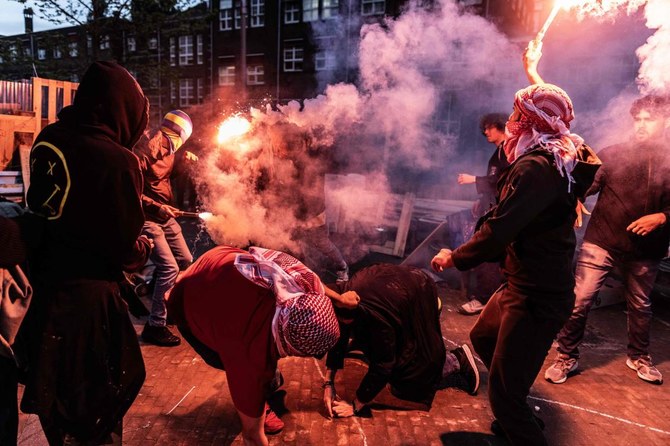
- Police said they had to act to stop the event and dismantle tents that been set up by protesters
- Outgoing Education minister Robbert Dijkgraaf said universities are a place for dialogue and debate and he was sad to see police had to intervene
AMSTERDAM: Dutch riot police ended a pro-Palestinian demonstration at an Amsterdam university early on Tuesday, arresting some 125 people in sometimes violent clashes, authorities said.
In messages posted overnight on social media X, police said they had to act to stop the event and dismantle tents that been set up by protesters, who used violence against police at the site.
“The police’s input was necessary to restore order. We see the footage on social media. We understand that those images may appear as intense,” police said.
Local media showed demonstrators shooting fireworks at police officers but there were no immediate reports of injuries on either side.
“All is now quiet ... police stay in the vicinity of the Roeterseiland campus,” police said later on X.
Outgoing Education minister Robbert Dijkgraaf said universities are a place for dialogue and debate and he was sad to see that police had to intervene.
Student protests over the war and academic ties with Israel have begun to spread across Europe but have remained much smaller in scale than those seen in the United States.
Last Friday, police in Paris entered France’s prestigious Sciences Po university and removed student activists who had occupied its buildings.
More than 100 students occupy the Ghent university, in Belgium, in both a climate and a Gaza protest that they want to prolong until Wednesday.
India election: Inside Modi and BJP’s plan to win a supermajority
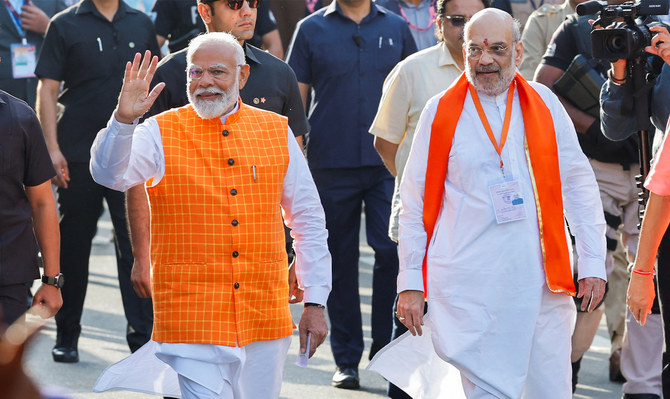
- Hindu nationalist BJP party and its allies are targeting 400 of 543 seats in India’s lower house of parliament
- Only once has a party crossed 400 mark, when Congress won following assassination of Indira Gandhi in 1984
BARPETA/THIRUVANANTHAPURAM, India: As India votes in a six-week general election, Narendra Modi’s image adorns everything from packs of rice handed out to the poor to large posters in cities and towns.
His Bharatiya Janata Party (BJP) is relying on the prime minister’s popularity as it seeks a super-majority in India’s parliament. Its message: Modi has delivered economic growth, infrastructure upgrades and India’s improved standing in the world.
But as the Hindu nationalist party and its allies target 400 of the 543 seats in India’s lower house of parliament — up from 352 won in 2019 — they are also employing local tactics in some vital constituencies they hope to wrest from the opposition.
Opinion polls indicate Modi will win a rare third term when voting ends on June 1. But only once in Indian history has a party crossed the 400 mark — when the center-left Congress party romped to victory following the assassination of its leader Indira Gandhi in 1984.
To examine how the right-wing National Democratic Alliance (NDA) aims to achieve that feat — and the obstacles it faces — Reuters spoke to nine NDA officials, three opposition leaders and two political analysts, as well as voters in six opposition-held seats the alliance is targeting.
They identified three of the BJP’s key tactics: enlisting celebrity candidates to unseat veteran opposition lawmakers; making an assault on the opposition’s southern strongholds by appealing to minorities such as Christians; and exploiting redrawn political boundaries that bolster the Hindu electorate in some opposition-controlled areas in the north.
“A combination of strategies, organizational commitment and tactical flexibility will help make inroads in seats never held by the party ever before,” BJP President J. P. Nadda, who oversees the party’s election strategy, told Reuters in April.
Some critics have warned the BJP would use a large majority to push through a more radical agenda in a third term. While the BJP’s manifesto focuses heavily on economic growth, it has also pledged to scrap separate legal codes for religious and tribal groups in areas such as marriage and inheritance.
Many Muslims and tribal groups oppose the plan, which would require a constitutional amendment to be passed by at least two-thirds of parliament.
“Modi wants a landslide majority only to be able to end the debate and deliberation on any policy matter in the parliament,” Congress party president Mallikarjun Kharge told Reuters.
Following low turnout in early voting, some BJP campaign officials have in recent days appeared less confident of securing a huge majority, though the party still expects to form the next government.
SOUTHERN STRATEGY
Modi’s party has criticized the dynastic politics that it says afflicts Congress, long dominated by the Nehru-Gandhi family. But in Pathanamthitta, a seat in the southern state of Kerala, it is fielding a political scion in Anil Antony — son of a veteran Congress leader.
The constituency, home to a sizeable Christian minority, has been held by Congress since its creation in 2009.
Anil’s father, former defense minister A.K. Antony, supports the incumbent and has denounced his son, a fellow Christian, for representing the Hindu nationalist party.
But Anil has another supporter: Modi, who came to Pathanamthitta in March and praised the BJP candidate for his “fresh vision and leadership.” The prime minister has visited the five states of southern India at least 16 times since December.
Nadda, the BJP president, acknowledged that winning a supermajority would require performing well in the five southern states, which are home to about 20 percent of India’s population but have not traditionally voted for his party.
In 2019, the NDA won just 31 of 130 seats across Andhra Pradesh, Karnataka, Kerala, Tamil Nadu and Telangana, all of which are linguistically diverse and have many Muslim and Christian voters.
Jiji Joseph, general secretary of the BJP’s minority wing in Kerala, said the party has made a concerted push for the 18 percent of voters there who are Christians. The BJP did not win a single seat in Kerala at the last general election.
“The BJP launched active contact with the Church and we started interacting with clergies directly,” he said, adding that the party now has 11,000 active Christian members. “There is a change. Christians now want to believe that BJP stands for them.”
In April, Anil became the first BJP candidate in Kerala to be endorsed by Christian leaders. He told Reuters his selection indicated the party offered opportunities to members from minority groups. He declined to comment on relations with his father.
Jayant Joseph, a Keralan Christian voter, said he backed the BJP because he had read media reports about Muslim men marrying Christian women and converting them to Islam. Most moderate Hindus consider allegations of large-scale forced conversions to be a conspiracy theory.
“Kerala is a secular state,” he said. “But for it to continue to be a secular state, the Muslim population and their conversion strategy must be kept under check.”
A Modi political aide, who spoke on condition of anonymity because he was not authorized to talk to media, said the NDA expects to win about 50 seats in the south.
K. Anil Kumar, a senior leader of Kerala’s ruling Communist Party of India (Marxist), said he did not believe BJP would do well in his state, which he said has a strong tradition of secularism.
“The BJP might try to side with the Christians on some issues but they are fundamentally a party of the Hindus and for the Hindus,” he said.
STAR CANDIDATES
In the Mandi constituency of the northern state of Himachal Pradesh, the BJP has recruited Bollywood actress Kangana Ranaut to break the Congress party’s grip on power. Congress is fielding as its candidate Vikramaditya Singh, whose mother currently represents the constituency. His father was the state’s long-time chief minister.
Ranaut, a political novice who calls herself a “glorious right-wing” personality, has starred in popular movies with nationalistic themes. She is known for her criticism of Bollywood executives who she said favored the relatives of famous actors for opportunities.
The actress is one of five actors running for the BJP this year, up from four in 2019.
No opinion polling on the Mandi race is publicly available.
Anjana Negia, an elementary school teacher who plans to vote for Ranaut, acknowledged that her preferred candidate had no political experience. But she said that she valued a new face and that a Modi-backed candidate would help “bring a fresh wave of development.”
Fielding celebrities and seeking the endorsement of entertainment personalities is relatively new for the BJP, which “long resisted such tactics because of its cadre-based nature” that prized grassroots efforts, said Milan Vaishnav, an expert on South Asian politics at the Carnegie Endowment for International Peace think-tank.
Ranaut declined an interview request. Federal BJP spokesman Shahzad Poonawala said she “has been successful in exposing dynastic culture and nepotism in Bollywood and now she is doing the same in politics.”
Singh, a state minister responsible for urban development, told Reuters that his family’s experiences gave him a better understanding of politics. Charges of nepotism were “shallow,” he said.
REDISTRICTING BENEFITS
The NDA is hoping for gains in the northeastern state of Assam, where it won nine of 14 seats in 2019. Assam’s BJP chief minister, Himanta Biswa Sarma, said in March he was confident of winning 13 seats.
The NDA’s confidence is rooted in a 2023 redistricting exercise in the state. India’s non-partisan Election Commission routinely redraws seat boundaries to reflect population changes; it is tasked with ensuring that no political party gains undue advantage from the changes.
But exercises since the last federal election in Assam and far-northern Jammu and Kashmir, India’s only majority Muslim region, diluted the Muslim vote in seats that the NDA is targeting, according to three BJP and four opposition officials.
The Election Commission declined to comment on the two exercises, citing the ongoing election.
In Assam, the NDA has high hopes for Congress-held Barpeta, which alliance candidate Phani Bhushan Choudhury said newly includes dozens of villages and some towns with large Hindu populations.
“Earlier (Barpeta) had a Muslim majority but now it is a Hindu majority,” said Choudhury. “That change has worked in my favor.”
He estimates that there are now 1.2 million Hindu voters in Barpeta, where he is campaigning on development and protecting the rights of what the NDA calls “indigenous Assamese” voters, who are mostly Hindu.
Choudhury’s Congress opponent Deep Bayan said the percentage of Hindus in Barpeta went from 30 percent to 70 percent. “Instead focusing on real issues affecting the people...(the BJP does) the politics of polarization,” he said.
Three of Jammu and Kashmir’s five seats are majority Muslim and held by the opposition. But the NDA hopes to swing one of them, Anantnag-Rajouri, after its voter rolls swelled by more than 50 percent to over 2 million, according to government data.
Many of the new voters are Hindus or from regional tribes — which benefited from new BJP policies awarding them education and employment privileges — according to regional BJP chief Ravinder Raina.
Raina said the BJP would support an NDA partner that it believed could win Anantnag-Rajouri and focus on retaining the two Hindu-majority seats it holds.
The two redistricting exercises presages a broader remapping of constituencies due after the election.
Vaishnav, of the Carnegie Endowment, said the remapping would distribute seats to the BJP-dominated north, which has much higher population growth rates, to the detriment of wealthier south India.



